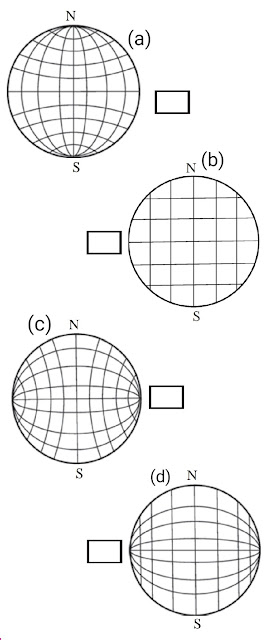The Earth and the Graticule
Balbharti Maharashtra State Board Class 6 Geography Solutions Chapter 1 The Earth and the Graticule
{tocify} $title={Go To}
Geography Class 6 Chapter 1 : The Earth and the Graticule
Q.A) Place a tick mark (✓) against the correct option.
(1) What term is used for the imaginary east-west horizontal lines on the earth?
(i) Meridians
(ii) International Date Line
(iii) Parallels
Answer: Parallels
(2) What is the shape of the meridians?
(i) Circular
(ii) Semicircular
(iii) Points
Answer: Semicircular
(3) What do the parallels of latitude and meridians of longitude together form on the globe?
(i) Angular distance
(ii) Hemisphere
(iii) Graticule
Answer: Graticule
(4) How many parallels are there in the northern hemisphere?
(i) 90
(ii) 89
(iii) 91
Answer: 90
(5) Which circles form the eastern and western hemispheres?
(i) 0° parallel and 180° meridian
(ii) 0° Prime Meridian and 180° meridian
(iii) North and South Polar circles
Answer: 0° Prime Meridian and 180° meridian
(6) Which circle appears as a point on the globe?
(i) Equator
(ii) North/South Pole
(iii) Prime Meridian
Answer: North/South Pole
(7) How many places on the earth may be located on 45° N parallel?
(i) One
(ii) Many
(iii) Two
Answer: Many
Q.B) Observe a globe and examine the following statements. Correct the wrong ones.
(1) Parallels of latitude lie parallel to the Prime Meridian.
Answer: Wrong: Parallels of latitude lie parallel to the equator.
(2) All parallels of latitude converge at the equator.
Answer: Wrong: All meridians of longitude converge at the poles.
(3) Parallels and meridians are imaginary lines.
Answer: Right.
(4) 8° 4′ 65″ N is a north meridian.
Answer: Wrong: 8° 4′ 65″ N is a north parallel.
(5) Meridians are parallel to each other.
Answer: Wrong: Latitudes are parallel to each other.
Q.C) Find the correct graticule out of the following and put a tick mark against it.
Answer: Figure (a) is correct.
Balbharti Maharashtra State Board Class 6 Geography Index
- Chapter 1 : The Earth and the Graticule
- Chapter 2 : Let us Use the Graticule
- Chapter 3 : Comparing a Globe and a Map; Field Visits
- Chapter 4 : Weather and Climate
- Chapter 5 : Temperature
- Chapter 6 : Importance of Oceans
- Chapter 7 : Rocks and Rock Types
- Chapter 8 : Natural Resources
- Chapter 9 : Energy Resources
- Chapter 10 : Human Occupations

